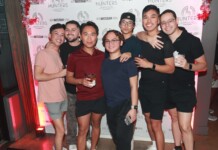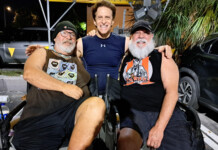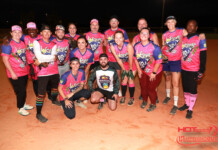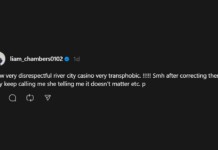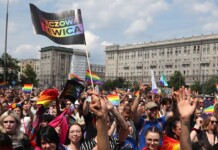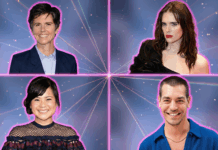On Zoom, where I recently met with Cara Delevingne, my ’90s-retro, rainbow-speckled button-down was, to my surprise, the first thing that came up.
“Nice shirt,” the model-actress told me, gushing when I mentioned picking it out of my closet in honor of just how queer “Planet Sex” is. The six-episode Hulu docuseries, which features Delevingne as sex-curious host, is still gayer than even the gayest rainbow shirt; within the first few minutes, Delevingne is judging a queer twerking contest. In fact, the entire series, dedicated to the “sexy queertastic people of the world,” is devoted to investigating various realms of queerness — and in doing so, illuminating parts of Delevingne’s own sexuality as a queer genderfluid person. Over the course of the series, she attends her first-ever Pride festival and, with the help of Gottmik, the first openly trans performer on “RuPaul’s Drag Race,” transforms into a butch drag king.
In our recent interview, Delevingne talked about how Hollywood affected her feelings on being queer, unlearning the shame around her sexuality, and why her identity now as a public figure is more authentic than ever.
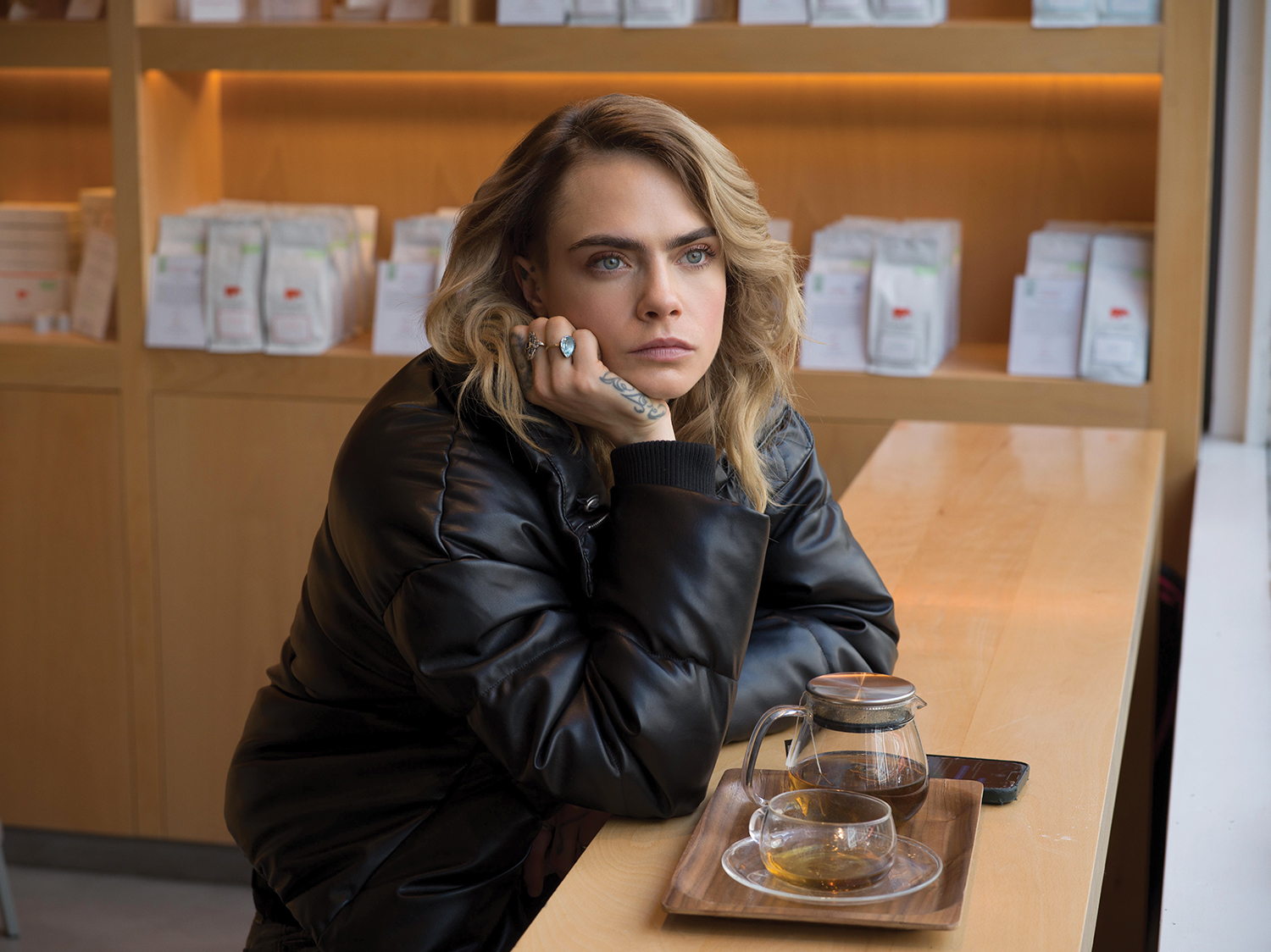 How much did the current political climate right now play into just how queer and sex positive you made this show?
How much did the current political climate right now play into just how queer and sex positive you made this show?
I think that’s how I wanted it to be. Because I think queer under the umbrella, it all can mean anything. It just means being different, however way. Everyone is different; we are not all the same. We wanna fit in, we wanna belong. But at the same time we wanna be individuals. So I wanted it to include everyone. And I think in that is queerness. And I love that, that’s my favorite thing in the world and I think leading with that, it brought me so much freedom. It brought me so much relief and love and, you know, it’s where I learned how to love myself.
So from the bottom of my heart, that’s what I wanted. I wish this kind of show existed when I was a kid. It would’ve made [it] so much easier. But I think the journey and the struggle and the adversity was something that made me who I am. But I just hope, especially in terms of people’s families or when people watch this, that they can have conversations that may be tricky. Because they can at least find the right wording or identify with a person that they see.
Can you remember something — a film, a TV show — that you clung to that really made you feel more comfortable with being queer?
I don’t know. The thing is… I guess I sought a lot of, like, Elton John or musicians. But there weren’t a lot of female ones. It was men. And so that still kind of made me feel a little… less. I mean… [laughs] Billie Jean King? I met her.
I was 22, though. So, it was a bit late. But not really. I think a lot of the things I surrounded myself were like… I guess porn was the first time I saw two gay women. But it wasn’t good, and it was definitely… they weren’t gay. I got scared of it, because I probably liked it.
You are a big deal star. And this is important because of your platform.
I thought you were about to say, “You’re a big gay.” I was like, thank you.
You are a big gay.
A big ol’ gay.
As someone with a massive following, though, I was wondering what are your feelings on how you’ve seen yourself versus how the media has portrayed who you are when it comes to gender identity and sexuality?
I think a lot of the times in the media, I was playing a part, always. But I was comfortable doing that because it meant I could kind of keep my own life to myself. But then to be honest, I didn’t really ever process or actually deal with anything. Or see what I was going through as I was going through it because inside I felt just confused and very lost, and very… without an identity, almost, because my identity was work. My identity was the parts I was given or the person I was meant to be or the brand I was working for. It wasn’t really ever me.
It was a whole, big old mess, really. It didn’t really make sense. But then I think in the show, looking back on it, I realized how much I love being a woman. I am genderfluid, for sure, but I liked playing between masc and femme and all those things. And I just think the binary of gender was so constricted when I was younger. “Boys play with this and girls play with that.” And I didn’t like what girls played with. But that didn’t make me a boy. But I got confused within that because I just wanted the same opportunities.
But again, I like to now decide when I really wanna be super femme or not. I like to be able to decide that because generally as a person I just like to be comfortable in what I look like and what I wear. But inside, I’m a woman and I’m sensitive. But I think it’s a lot deeper than that. I have a lot of masculine energy in me. We all have feminine and masculine energy, every human being. So I think that was a big thing for me, because I did question it a lot. I was like, “Am I non-binary? What am I?” But I’m not. But I love anyone being and feeling how they [are]. I do think that gender is too binary. But then, for me, I was very happy to have my pronouns.
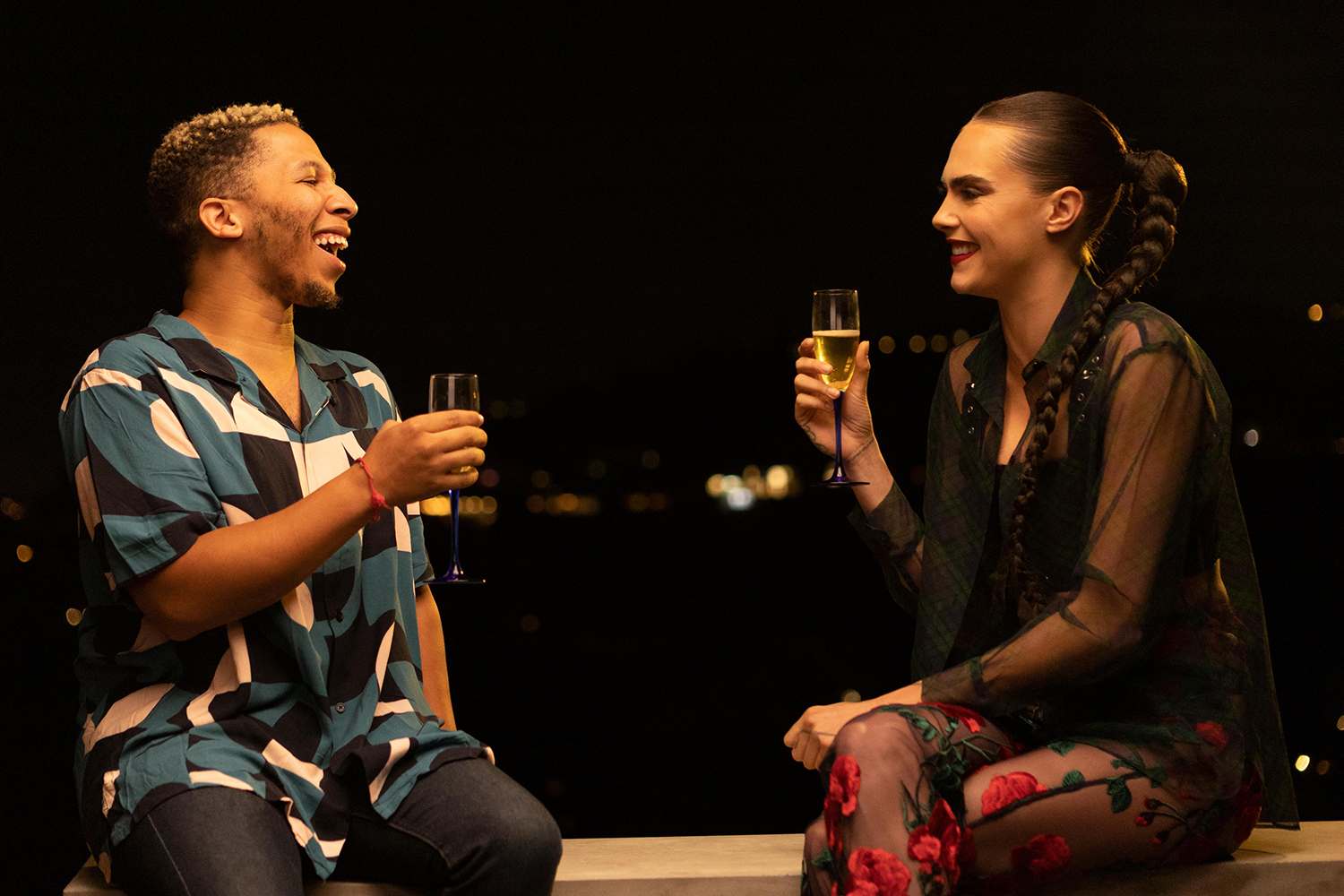 It sounds like you learned a lot about yourself through making this show, and maybe got to the truth of who you are?
It sounds like you learned a lot about yourself through making this show, and maybe got to the truth of who you are?
Yeah. I guess especially in terms of relationships and kind of abolishing the shame. Which I didn’t really have, but it made me realize how much I used to have and how much I hadn’t dealt with it. And how much I just kind of brushed it aside when actually I was like, “What am I really looking at here?” But the narrative I had wasn’t my own; it was other people’s. So that shame wasn’t really mine to hold and I had to give it back to the people who put it on me.
You say in the show that growing up famous can stunt a person’s growth, even when it comes to sexuality. I’m wondering specifically about Hollywood, because some people might think, “Oh Hollywood, it’s so queer. It’s a great place to immerse yourself if you’re queer, to be accepted.” How did that affect your journey to discovering your sexuality?
It was not like that for me at all. One of my first experiences with it was actually Harvey Weinstein who said to me, “You cannot be with a woman.” He was just like, “We need to find you a beard.” And I was like, “Who is this fucking stupid fat man?” He wasn’t nice. He was just a horrible man. Obviously we know that now. But he was like, “You’ll never work. No one will believe you as a straight character.” And I was like, “Oh, fuck. That’s bad.”
So there was just stuff like that, especially I think as a model no one cared either way. But they weren’t gonna celebrate it. I think it just stunts your growth a lot as in you don’t have time to be yourself. Or at least I did not. I felt like everything that was happening in my life, emotions and things, I just had to shove it down and keep going. Which is no one else’s fault but my own. I just… it was an easy way to run away from my stuff.
What was the most valuable takeaway for you from the whole experience of immersing yourself in queerdom through “Planet Sex”?
I think how much community and support is important. How much we can’t do this alone, anyone. Life, I’m talking about, generally. That through community and through connection, we can do the things that were not possible to do alone. And loving that and appreciating that. But also being vulnerable in that. I think a lot of times I would just show up kind of giving a surface experience [of] myself and it wasn’t real. Because I was just so scared of being rejected and so scared of people leaving, I guess.
But I love myself. I’m me. Messy, done up, all the things. It just makes me who I am. And if I love that then that’s the most important thing. I think a lot of this is more to do with self-love. I was just in a place of complete discovery. I was like, “Oh, what do I believe about relationships? What do I believe about all of these things?” Sometimes it’s OK not to know either. It’s OK not to know; it’s OK to keep discovering. It’s OK to question and wanna change.
There were so many moments where I thought I had it all figured out or I wanted to so badly have it figured out because I was like, “Then I’ll feel safe.” But the problem is it doesn’t work like that. And sometimes you end up running into a dead end when you think you know it and you just don’t. And it’s OK.
Aside from “Planet Sex,” there’s your part in “Only Murders in the Building,” where you play artist and gallerist Alice Banks, the love interest of Mabel Mora, played by Selena Gomez. Both shows feature queer representation, but “Only Murders” reaches people who may not see queer representation, or may not seek it out.
That’s why shows like that are so brilliant because it’s not a gay show where people go, “Oh this, I know, it’s ‘The L Word.’ We know what we’re getting here.” I think that’s why mainstream media and mainstream shows should do that more often where it’s not the main two characters or the whole story is based around queerness. It’s like, queerness is everywhere. So that’s how a show should be. It should be slipped in and it should be a conversation and it should be a part of it. When we wanna make queer content and we push it very hard, it’s gonna reach just other queer people and not what we want it to be: more normalized. So that’s why I was so grateful for that show and I think it was such an incredible way to do it.
What’s it like to bring that sort of representation to the screen with one of your closest and dearest friends, Selena Gomez?
I mean, it’s an easy day of work, isn’t it? It’s great. Especially when you love each other and I respect her so much as an actress and as a person. So it was just fun. It was great. And that show in general. Steve [Martin] and Martin [Short], everyone. It was just brilliant. I was basically playing myself too. Apart from I’m not that evil. I’m not a psycho.
Will we see you in the next season?
No, I wish. The lesbian went too overboard.
I think people had complicated feelings about that relationship in that last season.
Yeah, they did. It happens. I get it. Alice Banks is a nutcase.
This interview has been condensed and edited for clarity.




